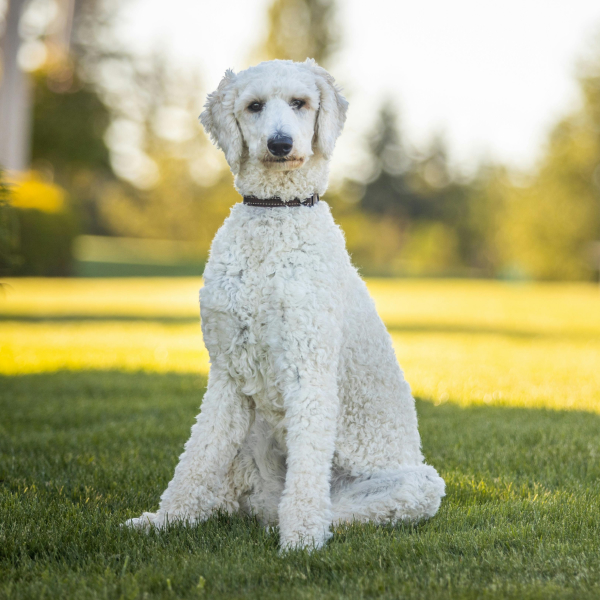Enrichment Series: Part 3/4

Originally bred to sit on the laps of British aristocrats, the Cavalier King Charles Spaniel is just as happy being a lapdog today—making them a great choice for first-time dog owners.
But these little dogs aren’t just couch companions. They’re adaptable and can keep up with more active lifestyles, too. With their friendly, even temperaments and affectionate nature, Cavaliers tend to get along well with children and make wonderful family pets.
And while their silky coats may look fancy, they actually shed very little—a big plus for anyone with allergies.

To keep your Cavalier happy and healthy, provide:

Health considerations:

Read more about this breed: https://www.akc.org/dog-breeds/cavalier-king-charles-spaniel/

Poodles come in three sizes—toy, miniature, and standard—but don’t let their smaller size fool you. Toy and Miniature Poodles are intelligent, energetic, and affectionate companions who thrive in both active and relaxed households.
These little dogs love spending time with their people and are highly adaptable, excelling in dog sports like agility while also making great indoor companions. Their coats may look high-maintenance, but since they lack an undercoat, they shed very little—making them a great choice for allergy sufferers.

To keep your Poodle happy and healthy, provide:

Health considerations:

Read more about this breed: https://www.akc.org/dog-breeds/poodle-toy/

Don’t let their delicate appearance fool you—Papillons are small but surprisingly sturdy dogs with big personalities. Named after the French word for "butterfly" due to their distinctive, wing-like ears, these tiny companions are alert, friendly, and full of energy. They love being around people and adapt well to different lifestyles, from active homes to quieter environments.
Despite their elegant coats, Papillons require minimal grooming since they lack an undercoat. They are highly intelligent and excel in agility and obedience, though, like many small breeds, potty training can take extra patience.

To keep your Papillon happy and healthy, provide:

Health considerations:

Read more about this breed: AKC Papillon

These small, playful, high-spirited companions are more hardy than they look. They are very affectionate and do well with people, children, and other dogs. They are ideal city dogs, boasting confidence. They may be known to bark, even out of excitement, but they are not guard dogs. They sport low-allergen coats and shed minimally.

To keep your Bichon happy and healthy, provide:

Health considerations:

Read more about this breed: AKC Bichon Frise

Labrador Retrievers are friendly, outgoing, and always ready for fun. They’re highly trainable, eager to please, and bond easily with both people and other dogs. As an active breed, they need daily exercise and mental stimulation, making them a great fit for families and dog sports. Labs are generally healthy but can be prone to hip and elbow dysplasia. Their short coats are low-maintenance, requiring only occasional baths. With their adaptable nature and loving personality, it’s no surprise they’re one of the most popular breeds around!

To keep your Labrador happy and healthy, provide:

Health considerations:

Read more about this breed: AKC Labrador Retriever

Golden Retrievers are loving, loyal, and always ready to work or play. They excel in therapy work, search and rescue, and hunting, but most of all, they make wonderful family companions. Like Labs, they need daily exercise and love outdoor activities. Their thick coats require weekly brushing, with more frequent grooming during shedding season. Generally healthy, they can be prone to hip dysplasia. Highly trainable and eager to please, Goldens are as smart as they are affectionate, making them a joy to have in any home.

To keep your Golden happy and healthy, provide:

Health considerations:

Read more about this breed: AKC Golden Retriever

Clumber Spaniels are mellow, affectionate companions with a playful, goofy side. While they may be reserved with strangers, they are deeply loyal to their families and do well with children. Sturdy and strong, they enjoy outdoor activities like swimming and retrieving but are just as happy lounging at home. Their thick coats require weekly brushing, and their facial folds need regular cleaning. Generally healthy, they can be prone to hypothyroidism. Intelligent but sometimes stubborn, they respond best to patient, gentle training. Expect some shedding and drool, but their sweet, easygoing nature makes up for it!

To keep your Clumber Spaniel happy and healthy, provide:

Health considerations:

Read more about this breed: AKC Clumber Spaniel

The Standard Poodle is the largest and most athletic of the Poodle varieties. Highly intelligent and full of energy, they excel in training and thrive on daily exercise, whether it’s swimming, agility, tracking, or hunting. Their low-allergen coats require regular brushing unless kept in a short trim. Generally very healthy, they can be prone to a few conditions. Eager to please and quick to learn, they shine in dog sports and make wonderful companions for active families.

To keep your Standard Poodle happy and healthy, provide:

Health considerations:

Read more about this breed: AKC Standard Poodle

Greyhounds are gentle, elegant, and surprisingly low-maintenance companions. While they can be reserved with strangers, they are affectionate with their families and have a calm, laid-back nature. They require minimal grooming, needing only occasional baths. Though happy to lounge around the house, they still need daily exercise and have an incredible turn of speed when given the chance to run. As sight-driven dogs, they can be more challenging to train and respond best to gentle, patient guidance. Generally very healthy, they make wonderful, easygoing pets for the right home.

To keep your Greyhound happy and healthy, provide:

Health considerations:

Read more about this breed: AKC Greyhound
Read the latest dog care advice, learn more about our services and explore vetted product recommendations.